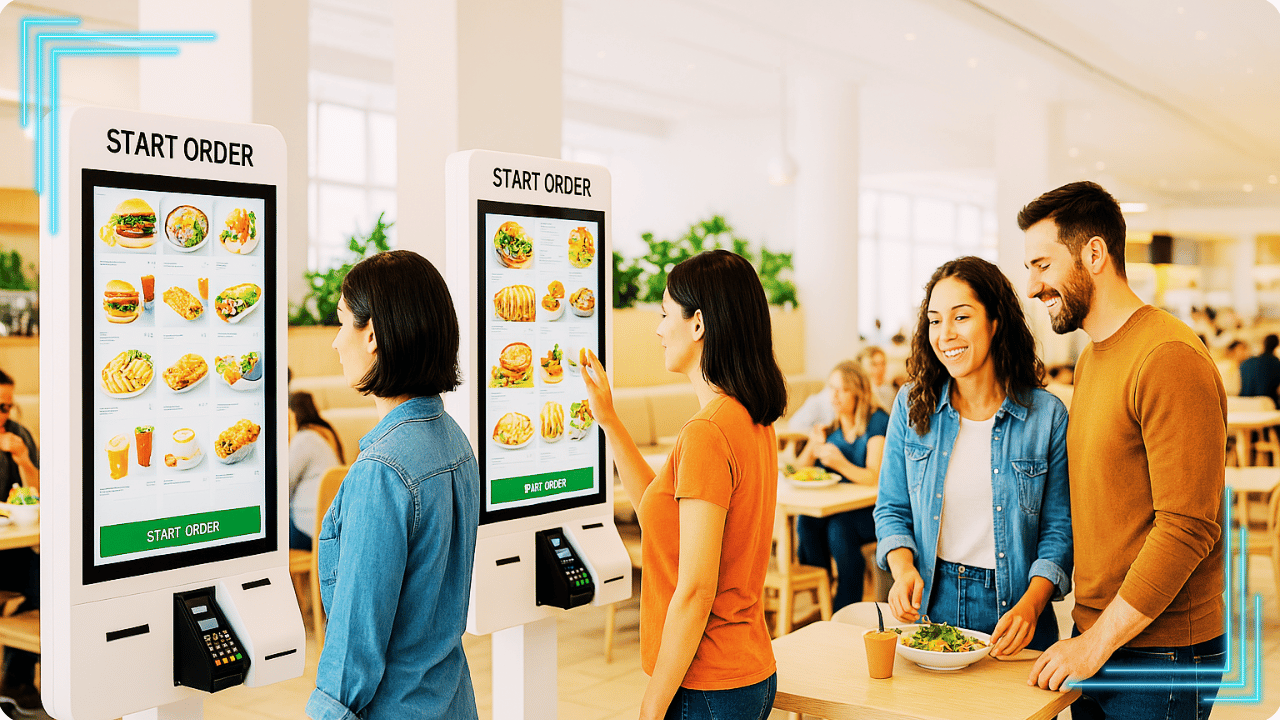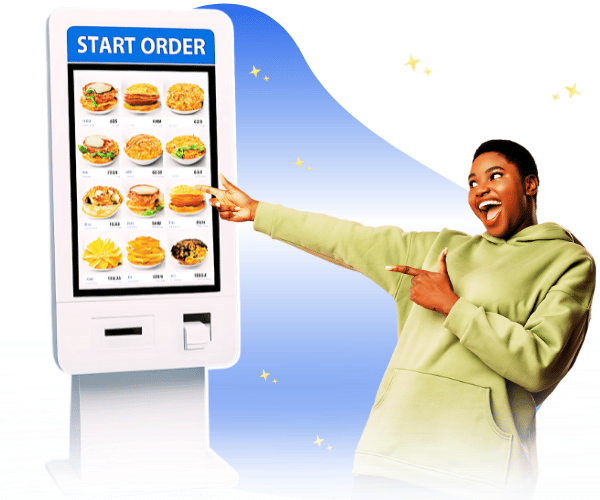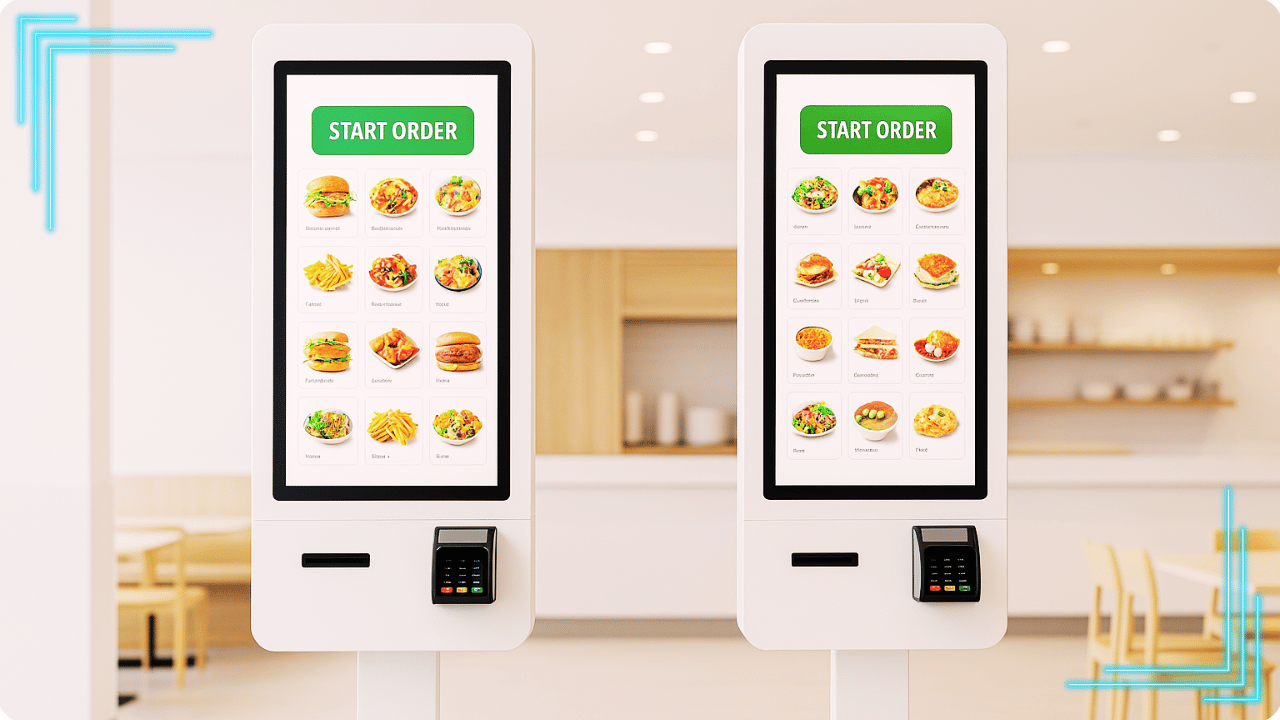
Wondering if a self-ordering kiosk is really worth the investment? If you’re asking that, you’ve probably noticed traditional service models are becoming outdated. Long lines, overwhelmed staff, order mistakes, and impatient customers slow down your growth, increase costs, and cause daily revenue loss.
Then the question hits: Is it really worth investing in a kiosk? Does it work? What if I spend the money and don’t see results? Don’t worry, the reality is that self-service kiosks aren’t just for big chains anymore. Today, even small restaurants are adopting this solution and seeing real benefits.
In this article, we’ll break down what actually changes when your food service installs an interactive ordering machine. Below, you’ll discover the 10 most important benefits and 2 key considerations you should think about before making a decision.

Here’s what you’ll learn in this guide:

Is a Self-Order Kiosk Really Worth It? Let’s Look at the Numbers
Still unsure if a self-order kiosk will benefit your restaurant? Let’s focus on what matters most: real costs and real returns.
A complete kiosk system, including a touchscreen, card reader, receipt printer, and ordering software, typically costs around $1,900 if purchased outright. Prefer to rent? Plans generally start from $500/month, including software updates and technical support.
Now picture this: your restaurant serves 100 customers a day. If the kiosk boosts your average ticket by just $5 per order through suggested combos and upsells…
📈 That’s $500 per day in extra revenue.
💰 Over a month (30 days), that adds up to $15,000 more in revenue, generated by a single smart device.
Even if you purchase the kiosk upfront, it could pay for itself within the first month.
And that’s without even factoring in:
💸 Labor cost reduction
❌ Fewer ordering errors
⚡️ Faster service & better customer flow
Sounds like a smart upgrade? That’s because it is, and for many restaurants, it’s the most cost-effective decision they’ve made all year.

Top 10 Pros and 2 Cons of Self-Order Kiosks
To help you make an informed decision, here’s a quick breakdown of the main pros and cons of self-service kiosks, a technology that’s already transforming restaurants of all sizes. Let’s look at 10 key advantages and 2 potential drawbacks to keep in mind.

Faster Service
Arrive. Tap. Pay. That’s it. Customers don’t have to wait in line or rely on a server to take their order.
You save time and serve more people during peak hours without sacrificing service quality. Higher table turnover, less waiting, better results.

Lower Labor Costs
Kiosks don’t replace staff, they reduce workload. That means fewer front-line employees needed to manage the same volume.
Less cashier time, less stress, fewer errors. It turns into savings, without sacrificing efficiency or customer experience.

Increased Average Ticket Size
This one’s a winner: the kiosk suggests combos, sides, and desserts automatically, and customers often say yes, because there’s no pressure.
Automated upselling and cross-selling work much better than manual prompts. Some restaurants report up to 20% increases in average check size.

Fewer Order Mistakes
No more ‘That’s not what I ordered.’ Customers see exactly what they’re getting, confirm the order, and complete payment themselves.
Orders are sent directly to the kitchen. No handwriting errors, no missed details. Less waste, more accuracy, and smoother operations.

More Customer Autonomy
Some customers just want to order at their own pace. A restaurant self-service terminal lets them do exactly that, without waiting or interacting if they don’t want to.
Card, mobile pay, even meal vouchers, everything’s handled on the screen. Meanwhile, your team can focus on food quality and table service.

A More Modern, Tech-Forward Image
When customers see a sleek, fully functioning kiosk at the entrance, their perception changes instantly: ‘This place is well managed.’
Self-ordering technology signals innovation and professionalism, even in a modest setting. It’s a brand upgrade from the first impression onward.

Consistent Service Experience
With a self-order kiosk, the customer experience doesn’t depend on a staff member’s mood, energy, or availability. The interface is always the same: clean menu, fast response, no interruptions.
You avoid inconsistent service between different employees. Every order feels standardized, from the first to the last guest of the day.

Smarter Data and Order Management
Every customer interaction is tracked: items selected, payment methods, time of day, best-performing combos…
That means you gain valuable insights to improve menu design, adjust staffing, fine-tune promotions, and forecast busy periods.
This is data-driven decision-making, not just gut feeling.

Easy Promotions and Combos
Ever launched a combo deal and no one noticed? With a kiosk, it’s front and center, right on the screen.
Highlight promos, showcase high-margin items, test new offers, and encourage impulse buys with engaging visuals. And you can update offers anytime, no reprinting menus or retraining staff.

Seamless Payment Options
No more outdated terminals or bottlenecks at the cashier. Today’s kiosks accept PIX (QR-based payments), credit/debit cards, mobile wallets, and meal vouchers.
This reduces friction, speeds up transactions, and minimizes congestion during peak hours, while ensuring secure, trackable payments for your business.

❌ Initial Investment Can Be High
Like any technology, there’s an upfront cost. Purchasing a full kiosk can range between $1,400 and $3,000. Even rental plans typically fall between $400 and $800 per month.
That number may raise concerns, especially for small operators.
However, ROI tends to be fast. Higher average checks, fewer errors, and lower labor costs often offset the investment within months. In the long run, not upgrading may be more expensive.

❌ Some Customers Might Struggle at First
Even with a user-friendly interface, some older customers or tech-averse guests may hesitate at first. But this is easily addressed with smart design, and ideally a team member nearby to assist during the early days.
Many restaurants implement kiosks as an option, not a replacement. This way, guests transition naturally, and soon the kiosk becomes just another part of their dining routine.

What’s the Risk of NOT Using a Kiosk?
While you’re still wondering whether self-order kiosks are worth it, a local competitor might already be reaping the benefits of being the first to innovate.
What used to be a ‘regular’ place can suddenly gain traction, serving faster, minimizing wait times, and improving team focus, all thanks to a kiosk.
Today’s diners (and tomorrow’s) want convenience, speed, and control. They don’t want to wait for a server, deal with errors, or stand in line to pay. Restaurants that deliver on that win.
Standing still now means risking losing customers, not because the food is bad, but because the experience feels outdated. An ordering kiosk shows your restaurant is modern, organized, and guest-focused. It’s more than just technology, it’s a strategy for staying competitive.

A Quality Kiosk Can Help You Sell More Consistently
So, are self-order kiosks worth it if you’re trying to boost revenue and modernize your restaurant?
Absolutely. The benefits are practical, measurable, and already improving operations for thousands of restaurants worldwide.
You gain speed, cut labor costs, improve accuracy, and offer a more seamless experience to every guest who walks through your door.
Yes, there’s an investment. But in many cases, it pays off quickly. And those who get in early gain a real edge over the competition.

👉 Want to know how much it would cost for your business?
Fill out the form below, it takes just a few seconds. A certified kiosk partner will contact you to share pricing, available models, and even offer a live demo if you’re interested.
It’s quick, direct, and totally commitment-free. Let’s take the next step toward smarter service.

Frequently Asked Questions

🔔 Self-Service Kiosk: How Much Does It Cost?⇗
🔔 Trusted Chinese Supplier for Kiosks⇗
🔔 7 Benefits of Self-Service Kiosks⇗
